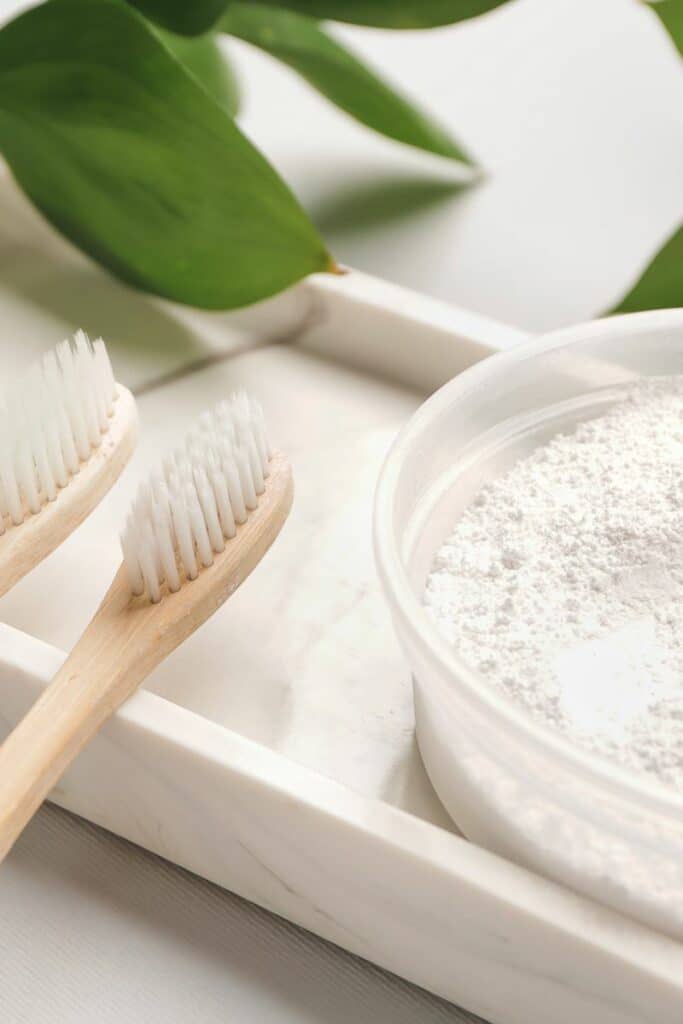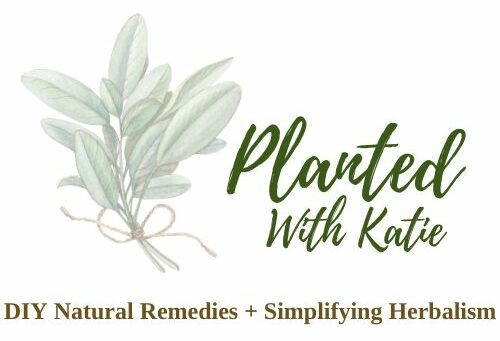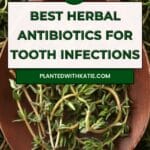Top 5 Natural Herbal Antibiotics For Tooth Infection
Dealing with a painful tooth infection can be tough, but herbal antibiotics for tooth infection offer a natural way to fight harmful bacteria and support healing. These natural remedies have been trusted to reduce swelling, ease pain, and promote gum health.

Disclaimer: This is not medical advice. Information and statements shown here are for educational and informational purposes only and are not to replace the advice of your healthcare professional.
This post may include affiliate links. Please refer to our disclaimer for full disclosure.
In this article, we’ll explore five powerful herbs with proven antibacterial properties, how they work, and simple ways to use them. Whether you’re looking for a temporary solution or a natural addition to your oral care routine, these remedies can help you manage minor infections while keeping your mouth healthy.
What Are Tooth Infections and Why Use Herbal Remedies?
A tooth infection happens when harmful bacteria invade the soft tissues inside or around a tooth. This can lead to an abscessed tooth, gum infection, or other dental problems that might spread to other parts of the mouth. A tooth abscess is a pocket of pus caused by a bacterial infection, often affecting the gums, tooth root, or nearby soft tissues.
Common Symptoms of a Tooth Infection
- Tooth pain that worsens when chewing or touching the tooth
- Swollen, red, or irritated gum tissues
- Bad breath or a foul taste in the mouth
- Sensitivity to hot or cold foods
- Swelling in the face or neck near the affected area

Why Use Herbal Remedies for Tooth Infections?
Herbal remedies are a great option for easing the symptoms of a tooth infection and supporting oral health. Many herbs and natural treatments have antibacterial, anti-inflammatory, and pain-relieving properties. They can reduce swelling, fight harmful bacteria, and soothe the affected tooth and gums.
Herbal treatments like oil pulling with coconut oil, rinsing with saltwater, or using essential oils can be effective ways to manage minor dental infections. These natural remedies also promote oral hygiene and may help prevent dental abscesses from getting worse. While they can provide temporary relief, it’s important to seek professional dental treatment for serious infections or symptoms that don’t improve.
Top 5 Natural Herbal Antibiotics For Tooth Infection
1. Myrrh: A Timeless Oral Care Powerhouse
Myrrh has been used for thousands of years as a natural remedy for dental infections and gum problems. It was a popular treatment for infected teeth in Ayurvedic and Chinese medicine and was highly valued in traditional medicine for its ability to heal oral infections.
Myrrh contains natural compounds called sesquiterpenes, which have strong antibacterial, antifungal, and pain-relieving properties. These active ingredients help fight harmful bacteria in the oral cavity, reduce swelling in gum tissues, and relieve dental pain. Because of these properties, myrrh has been used to treat tooth abscesses, gingivitis, and mouth ulcers.
Modern research supports myrrh’s use in dental care. Studies show that it can reduce symptoms of gum infection and oral inflammation while providing relief from tooth pain. It also promotes healing in the affected area by improving blood flow and soothing soft tissues.
To use myrrh for dental problems, you can make a mouthwash by diluting a few drops of myrrh tincture in warm water. Swish the solution around your mouth for a minute before spitting it out. Myrrh powder can also be mixed with olive oil or coconut oil to create a paste for gum massage, helping soothe gum abscesses and fight bacterial infections.

2. Calendula: The Soothing Healer
Calendula is a gentle yet powerful herb often used for dental infections and gum problems. It is known for its strong anti-inflammatory and wound-healing properties, making it a great choice for soothing irritated gum tissues and promoting healing in the affected area.
Studies back up calendula’s effectiveness for dental care. One study showed that using a calendula mouthwash helped reduce plaque and gum bleeding in people with gum infections. This is because calendula contains natural antimicrobial oleoresins, which fight harmful bacteria while reducing inflammation in soft tissues.
Using calendula is simple and effective. To make a mouth rinse, dilute a few drops of calendula tincture in warm water and swish it around your mouth for one to two minutes. This can help reduce dental pain, bad breath, and symptoms of gum infection. You can also mix calendula into DIY oral care products, like tooth powders or soothing gum pastes, for added antibacterial effects and relief from gum abscesses.
3. Sage: Antibacterial and Astringent Herb
Sage is a well-known herb for treating dental infections and gum problems. It has natural antiseptic and astringent properties, which make it great for reducing swelling, fighting harmful bacteria, and improving gum health. Sage is especially effective against bacteria that cause gum infections, such as Porphyromonas gingivalis, a common culprit behind periodontal disease.
Studies show that sage can also help with tooth decay by preventing harmful bacteria from spreading in the oral cavity. It supports oral hygiene and can even aid in remineralizing teeth when used in combination with bentonite clay and baking soda in a natural tooth powder.
Using sage for dental care is easy. You can make a sage tea rinse by steeping dried sage leaves in boiling water, then cooling it to room temperature before swishing it around your mouth.
Another effective way is to create a homemade sage tooth powder. Mix equal parts ground sage, baking soda, bentonite clay, and a few drops of peppermint oil for added antibacterial effects and fresh breath. Both methods help soothe gum tissues, reduce tooth pain, and keep your oral cavity healthy.
4. Clove: The Pain-Relieving Antibacterial
Clove is one of the strongest natural antibiotics for dental infections. It contains eugenol, a compound known for its powerful antibacterial, anesthetic, and anti-inflammatory properties. Eugenol not only kills harmful bacteria causing tooth abscesses and gum infections but also numbs the affected area to reduce tooth pain.
Clove has been used for centuries in traditional medicine to treat toothaches, sore gums, and other oral infections. Its natural antiseptic properties make it an effective way to manage dental problems and prevent them from worsening.
Using clove for dental care is simple and highly effective:
- Clove Oil: Mix a drop of clove oil with equal parts coconut oil or olive oil. Soak a cotton ball in the mixture and gently press it onto the affected tooth for temporary relief.
- Whole Cloves: Place a whole clove on the infected tooth and bite down gently. This releases the clove’s active ingredients to help ease the pain.
- Mouth Rinse: Add 1 drop of clove oil to warm water and swish it around your mouth. This can reduce bacteria and freshen your breath.
Clove is a great home remedy for gum abscesses, tooth decay, and other dental problems. It’s a quick and effective way to ease symptoms while supporting your oral hygiene.

5. Thyme: The Antimicrobial Herb
Thyme is a powerful herb with natural antibacterial and antifungal properties that make it perfect for fighting dental infections. It contains thymol, an active ingredient that combats harmful bacteria like Streptococcus mutans (which causes tooth decay) and Candida albicans (a fungus that can lead to oral infections).
Research shows that thyme is effective against oral pathogens and helps support healthy gums. It also reduces inflammation in the affected area, which can ease gum pain and swelling.
Here are some easy ways to use thyme for dental care:
- Thyme Tea Rinse: Steep a teaspoon of dried thyme leaves in a cup of hot water. Let it cool, then swish it around your mouth to cleanse and reduce harmful bacteria.
- Thyme Oil: Mix a drop of thyme essential oil with equal parts coconut oil or olive oil. Use a cotton ball to apply the mixture directly to the infected tooth or gums.
- DIY Toothpaste Add-In: Add a pinch of powdered thyme to your toothpaste for an extra antimicrobial boost during brushing.
Thyme’s antimicrobial activity makes it one of the best natural remedies for tooth abscesses, gum infections, and overall oral hygiene.
Are All 5 Of These Considered Natural Herbal Antibiotics?
Yes, all of the herbs discussed—myrrh, calendula, sage, clove, and thyme—are considered natural antibiotics because they possess antibacterial properties that can help fight harmful bacteria. Here's how each one qualifies as a natural antibiotic:
- Myrrh: Contains sesquiterpenes with antibacterial effects. Traditionally used to treat infections in the oral cavity and gum tissues.
- Calendula: Has antimicrobial oleoresins that fight bacteria, reduce inflammation, and promote healing in gum infections and abscesses.
- Sage: Its natural antiseptic and antibacterial properties target bacteria like Porphyromonas gingivalis, a major cause of gum disease.
- Clove: Contains eugenol, a compound known for its potent antibacterial effects, especially against bacteria causing tooth abscesses and decay.
- Thyme: Thymol, its active ingredient, has strong antimicrobial activity, combating bacteria and fungi like Streptococcus mutans and Candida albicans.
These herbs are considered among the strongest natural antibiotics for dental care because they inhibit bacterial growth and support oral health. They’re great options for managing minor infections, but serious or persistent infections should still be addressed by a dentist.
10 Other Notable Natural Remedies for Tooth Infections
In addition to the top five herbal antibiotics, there are other natural remedies that can help manage tooth infections and support oral health. These remedies have antibacterial, anti-inflammatory, and soothing properties that can provide temporary relief and aid in healing.
1. Oil Pulling with Coconut Oil
Oil pulling is a traditional remedy where you swish coconut oil in your mouth to reduce harmful bacteria and improve oral hygiene. Coconut oil has natural antibacterial properties that help combat bacterial infections and soothe gum tissues.
- How to Use: Swish a tablespoon of coconut oil in your mouth for 10-15 minutes, then spit it out (never swallow). Follow with a warm saltwater rinse for best results.

2. Saltwater Rinse
A simple saltwater rinse is an effective way to clean the oral cavity and reduce inflammation. The salt acts as a natural antiseptic, helping to kill bacteria and draw out pus from an abscessed tooth.
- How to Use: Dissolve a teaspoon of salt in a cup of warm water. Swish the solution in your mouth for about 30 seconds and spit it out.
3. Oregano Oil
Oregano oil is rich in carvacrol, a compound with strong antibacterial and antimicrobial activity. It can help reduce the infection and ease tooth pain.
- How to Use: Mix one drop of oregano essential oil with a carrier oil like olive oil. Apply it directly to the affected area using a cotton swab.
4. Fresh Garlic
Garlic has natural antibiotic and antimicrobial effects due to its active compound, allicin. It’s a popular home remedy for fighting bacterial infections and reducing tooth pain.
- How to Use: Crush a clove of garlic to release its juice and apply it directly to the infected tooth or gums for a few minutes. Rinse your mouth with warm water afterward.

5. Tea Tree Oil
Tea tree oil is a powerful natural antiseptic that can kill bacteria causing dental infections. It also helps reduce inflammation and freshens breath.
- How to Use: Dilute a drop of tea tree oil in warm water and use it as a mouth rinse. Alternatively, mix it with coconut oil and apply it to the gums.
6. Colloidal Silver
Colloidal silver is a natural antimicrobial that has been used for centuries to treat infections. It can help fight bacteria in the oral cavity and promote healing of gum abscesses.
- How to Use: Rinse your mouth with a small amount of colloidal silver, or apply it directly to the infected tooth with a cotton swab.
7. Aloe Vera Gel
Aloe vera has soothing and antibacterial properties that make it helpful for gum infections and inflamed tissues. It can also aid in healing and reduce swelling.
- How to Use: Apply pure aloe vera gel directly to the affected area and let it sit for a few minutes before rinsing.
8. Herbal Teas
Herbal teas like green tea, goldenseal tea, and fenugreek tea can offer antibacterial and anti-inflammatory benefits. They can also soothe gum tissues and help flush out harmful bacteria.
- How to Use: Brew the tea, allow it to cool, and use it as a rinse. You can also apply a wet tea bag directly to the affected tooth or gum.
9. Cold Compress
A cold compress helps reduce swelling and numbs the pain caused by a tooth abscess or gum infection. While it doesn’t treat the infection, it provides temporary relief.
- How to Use: Wrap a cold pack or ice in a cloth and hold it on the outside of your cheek near the affected area for 10-15 minutes.
10. Hydrogen Peroxide Rinse
Hydrogen peroxide can kill bacteria in the mouth and help clean an infected area. It also reduces bad breath caused by bacterial buildup.
- How to Use: Mix equal parts of 3% hydrogen peroxide and water. Swish it in your mouth for 30 seconds, then spit it out. Avoid swallowing.
Conclusion
The five herbs we explored—myrrh, calendula, sage, clove, and thyme—offer powerful, natural solutions for managing tooth infections. Their antibacterial, anti-inflammatory, and soothing properties make them excellent choices for fighting harmful bacteria, reducing swelling, and easing dental pain. These remedies also support overall oral health, helping to prevent further dental problems like gum infections and tooth decay.
While these natural remedies can provide temporary relief and assist in healing, it’s essential to consult a dentist for severe infections, persistent symptoms, or dental abscesses that require professional treatment.
Do you have a favorite natural oral care tip or remedy? Share it in the comments! Don’t forget to subscribe to discover more DIY herbal remedies and take control of your health naturally.



